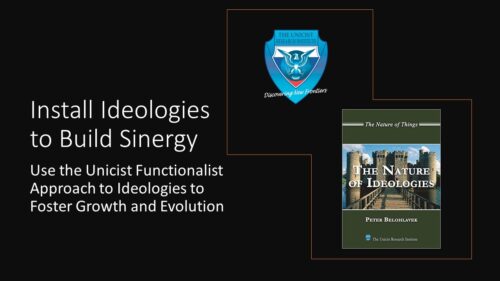Install functional ideologies in your environment
We invite you to define the functional ideologies that allow enhancing the synergy of your culture, group, or organization.

Ideologies save energy while they provide the complement that is needed to achieve the objectives that have been defined and drive the evolution of institutions and organizations. Their use only requires adopting a functionalist approach.
Ideologies are beliefs that use technologies to satisfy a given interest. This explains why adaptive people change their ideologies based on their personal evolution.
Ideologies sustain the functional ethics of people that vary according to their maturity. Ideologization happens within the dominant myths of a culture. These cultural myths are defined by the functional myths that sustain the values of the environments and the fallacious myths that hide the weaknesses the environment cannot bear.
Use the Power of Functional Ideologies
Organizations, according to their type of activity, also have an ideology that sustains their functional ethics and allows them to exist and evolve.
Ideologies might be absolute or functional. Absolute ideologies exist in stages where people are driven by a survival ethics. They are based on the development of clientelism, which defines that “you are with me or against me”.
This is noticeable in stagnated or declining countries or organization. Ideologies are not absolute, but functional in developed or evolving countries.
Absolute ideologies necessarily divide the environment between “us” and “them”. The building of bridges is a “deadly sin”.
Functional ideologies integrate people towards an evolution process and require democratic leaders. Absolute ideologies integrate people in absolutist environments and require autocratic leaders. This book will provide the structural information to define the ideology that is functional in your environment.
Unicist Innovation Center – A Sharing Space
The Unicist Research Institute
The Unicist Functionalist Approach: The functionalist approach is based on the use of binary actions that are composed by two synchronized actions where the first one opens possibilities and the second one ensures results. The use of univocal actions only works in fully controlled processes or where the environment provides the second action that sustains it. Therefore, the use of binary actions is not optional when it is needed to ensure the generation of results. www.unicist.org
